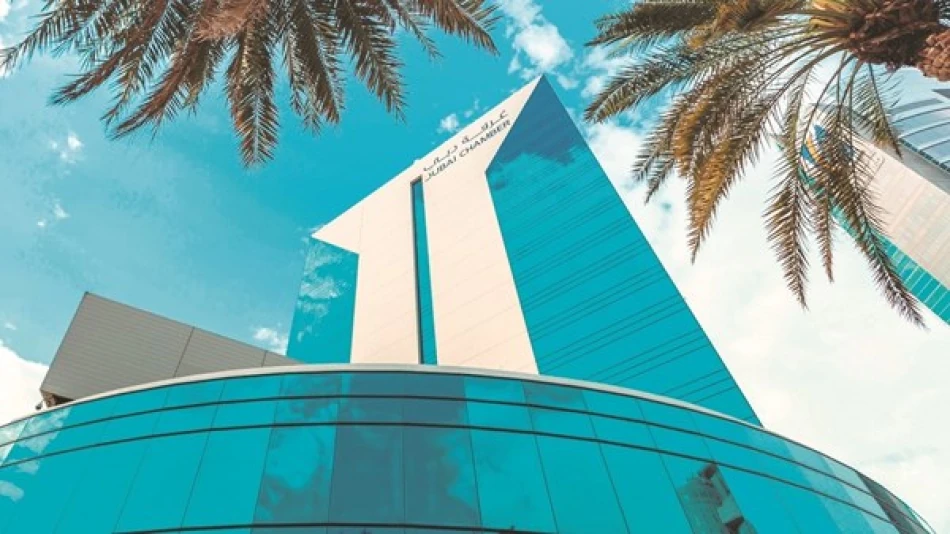
Gulf States Dominate Dubai Chamber Exports in H1, Capturing 48.6% Share
Dubai's Trade Boom Reveals Gulf States' Economic Dominance in Regional Commerce
Dubai Chamber of Commerce members achieved remarkable export growth of 18% in the first half of 2025, with Gulf Cooperation Council (GCC) markets capturing nearly half of all trade flows worth AED 83.6 billion ($22.8 billion). This surge underscores Dubai's pivotal role as the Middle East's commercial gateway and highlights the deepening economic integration within the Gulf region.
GCC Markets Lead Dubai's Export Destinations
The dominance of GCC markets is striking, accounting for 48.6% of total exports and re-exports from Dubai Chamber members during the first six months of 2025. This AED 83.6 billion figure reflects the robust intra-Gulf trade relationships that have strengthened significantly since the resolution of the Qatar blockade in 2021 and the broader regional push for economic diversification.
The broader Middle East region, excluding GCC states, secured the second position with a 29% share valued at AED 49.9 billion, demonstrating Dubai's expanding influence across the region's emerging markets.
Geographic Distribution Reveals Strategic Trade Patterns
Regional Powerhouse Performance
African markets claimed third place with 9.7% of exports worth AED 16.7 billion, positioning Dubai as a crucial bridge between Gulf capital and Africa's growing consumer markets. This aligns with the UAE's broader Africa strategy, including significant investments in ports, logistics, and financial services across the continent.
Asia-Pacific markets, traditionally strong trading partners, captured 8.5% of exports valued at AED 14.6 billion. While this represents solid performance, the relatively modest share compared to regional markets suggests Dubai's increasing focus on nearby high-growth economies rather than distant Asian manufacturing hubs.
Western Markets Show Limited Penetration
European markets secured just 3% of Dubai's export flows (AED 5.2 billion), while North American markets claimed a mere 0.7% (AED 1.2 billion). Latin America trailed with 0.4% worth AED 680 million. These figures highlight the ongoing regionalization of global trade, where geographic proximity and cultural ties increasingly trump traditional Western commercial relationships.
Market Implications and Economic Significance
Investment Opportunities in Regional Integration
For investors, Dubai's export data signals several key trends. The overwhelming dominance of regional markets suggests that companies with Gulf and Middle East exposure are likely to outperform those focused on traditional Western markets. This shift creates opportunities in logistics, financial services, and consumer goods tailored to regional preferences.
The 18% annual growth rate significantly outpaces global trade growth, indicating that Dubai's strategic positioning continues to generate premium returns for businesses leveraging its hub status.
Comparison to Global Trade Hubs
Unlike Singapore, which maintains balanced exposure to both regional and global markets, Dubai's trade pattern shows increasing regional concentration. This mirrors trends seen in other emerging market hubs but contrasts sharply with traditional entrepôts like Hong Kong, which have faced challenges due to geopolitical tensions.
The UAE's success in capturing regional trade flows reflects strategic investments in infrastructure, favorable business policies, and political stability that many regional competitors cannot match. This positions Dubai to potentially expand its market share further as regional economies continue diversifying away from oil dependence.
Future Trajectory and Strategic Positioning
Dubai's export performance demonstrates the emirate's successful transformation from an oil-dependent economy to a diversified commercial hub. The concentration of trade within the GCC and broader Middle East reflects both opportunity and risk – while regional growth provides substantial upside, economic diversification across global markets remains limited.
The data suggests Dubai is becoming the undisputed commercial capital of the Middle East, with its chamber members increasingly serving as the primary conduit for regional trade flows. This trend is likely to accelerate as regional integration deepens and infrastructure projects like the GCC railway network come online.
Most Viewed News

 Layla Al Mansoori
Layla Al Mansoori






